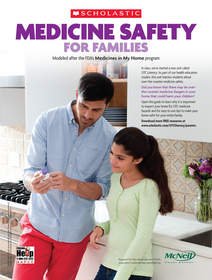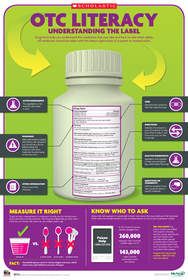NEW YORK, NY--(Marketwired - Nov 4, 2013) - The American Association of Poison Control Centers (AAPCC), together with Scholastic (NASDAQ: SCHL), the global children's publishing, education and media company, are continuing their commitment to help educate "tweens" on the safe use of over-the-counter (OTC) medicines with their expanded OTC Literacy classroom program. Research shows that tweens begin to self-administer medicine around 11 years old, or around 5th or 6th grade. With cold and flu season in full swing, it is a good time for parents and guardians of tweens to teach their children about OTC medicine safety.
The OTC Literacy program, which launched earlier this year in schools nationwide, now includes new resources and engaging educational activities specifically designed for parents and teachers of tweens to increase knowledge of OTC safety and responsible use. Education about OTC medications, such as how to read a Drug Facts label, is critical -- giving tweens the knowledge they need to become responsible adults who follow label instructions for OTC medications. The program places special emphasis on the message that tweens should only take OTC medications with the permission and supervision of parents or guardians. Educators and parents can also download all of the materials online at www.scholastic.com/OTCliteracy/parents.
"It's important for tweens to learn about OTC medication safety, including how to read directions, follow dosing guidelines, properly measure medication, store medications out of reach of younger siblings and to always consult a parent or trusted adult prior to taking any medication," says Tanya Altmann, M.D., F.A.A.P., a pediatrician and child health expert trained at the University of California, Los Angeles who is facilitating dialogue with parents about the need for more awareness regarding OTC Literacy among tweens. "Tweens also must understand that OTC medication is often helpful when taken at appropriate doses, but can be extremely dangerous if taken incorrectly, in excess or too often."
The OTC Literacy program features new resources that are specifically designed to help facilitate conversations and provide learning opportunities for tweens. These materials include: an illustrated digital story, a digital student assessment quiz, a "Home Hazards Hunt" flash game and many other tools that can be used at home or in the classroom. Most of the family resources and tools are available in both English and Spanish.
Parents play a critical role in helping their tweens learn about the responsible use of OTC medicines. With approximately 10,000 children seen in emergency departments every year due to medication errors from the self-medication of OTCs, it is important for parents and guardians to discuss the safe use and storage of OTC medicines with their tweens. The OTC Literacy program equips parents, teachers and guardians with the necessary materials to help facilitate these critical discussions.
"The engaging, multi-media instructional materials in the OTC Literacy program help teachers and families increase children's understand of medicine safety in real-world situations while building students' reading comprehension skills and academic vocabulary," shares Ann Amstutz Hayes, Senior Vice President, National Partnerships, Scholastic. "We are pleased to provide this free educational program to teachers and families who might otherwise not have access to this important information."
Please visit www.scholastic.com/OTCliteracy/parents for supportive tips on how to discuss OTC Literacy.
About AAPCC
The AAPCC promotes the nation's 57 poison centers and supports their efforts to prevent and treat poison exposures. Poison centers offer free, confidential medical advice 24 hours a day, seven days a week through the Poison Help Line at 1-800-222-1222. This service provides a primary resource for poisoning information and helps reduce costly emergency department visits through in-home treatment. To learn more, visit www.aapcc.org, like us on Facebook, follow us on Twitter, or read our blog at aapcc.wordpress.com. To join your voice with other poison center supporters, register for the AAPCC advocacy network at www.capwiz.com/aapcc -- click on "Action E-List."
About Scholastic
Scholastic Corporation (
Contact Information:
Media Contact:
Jayme Owen
919-334-3779


